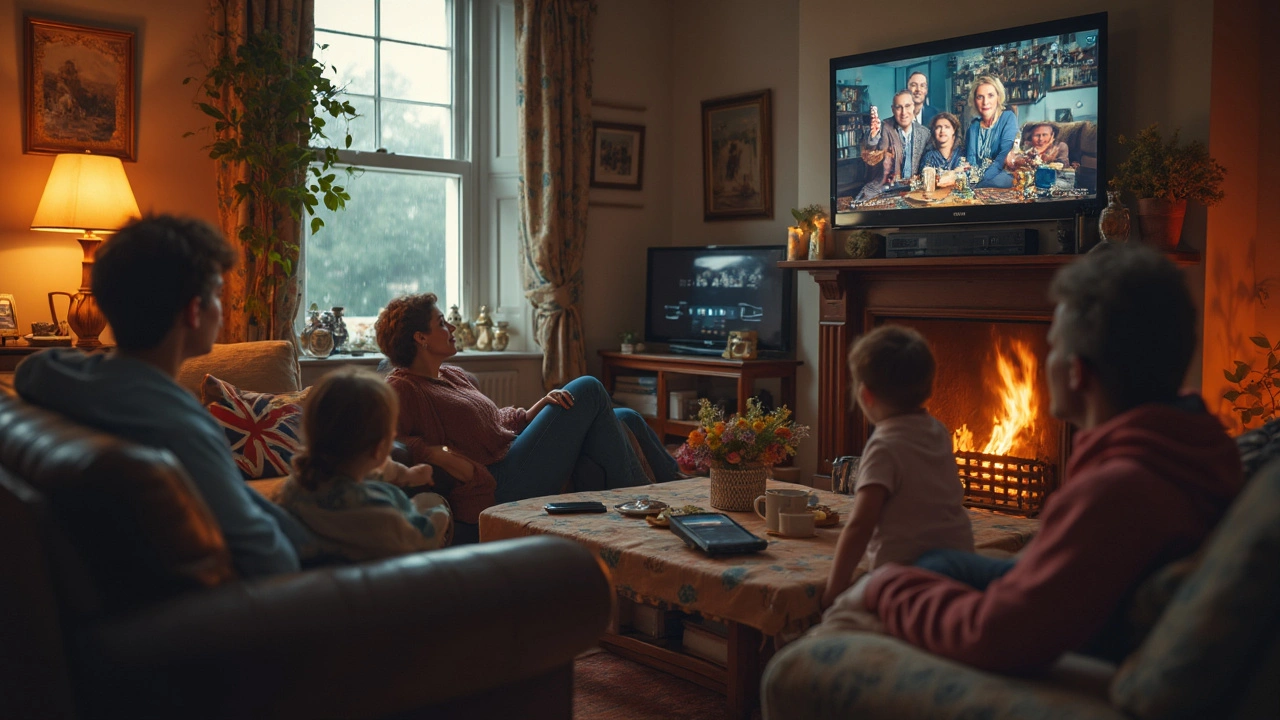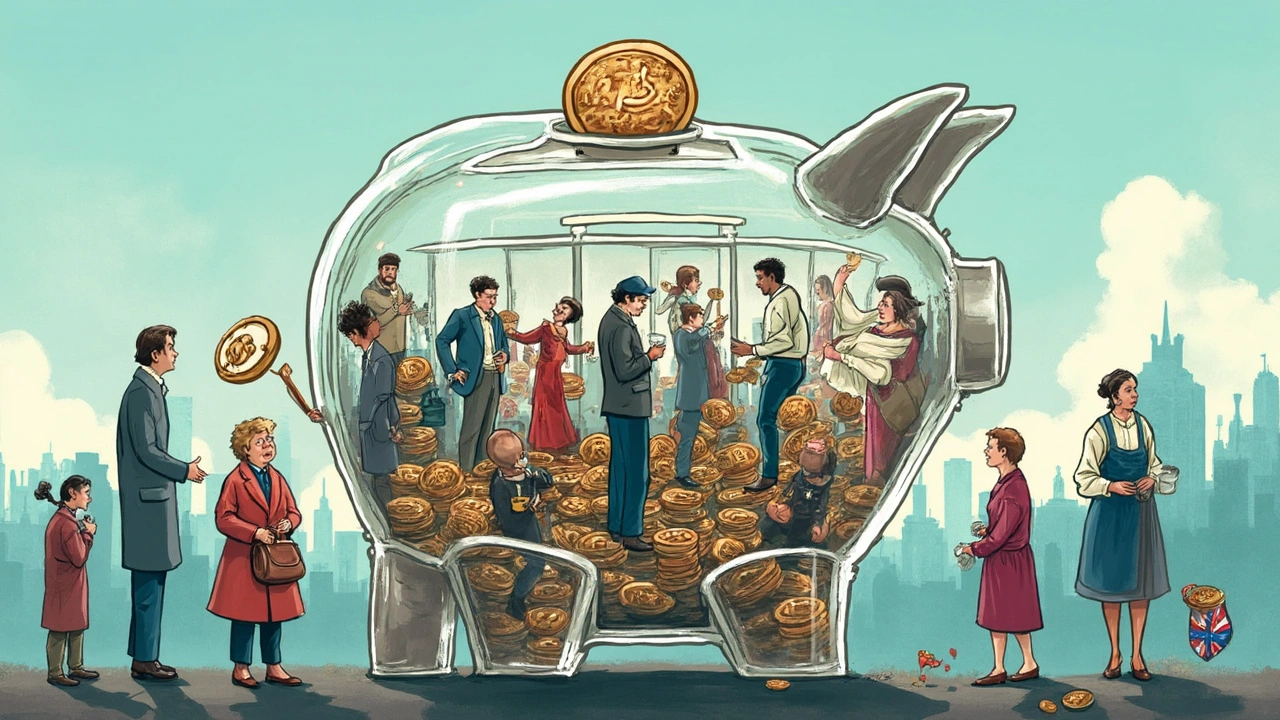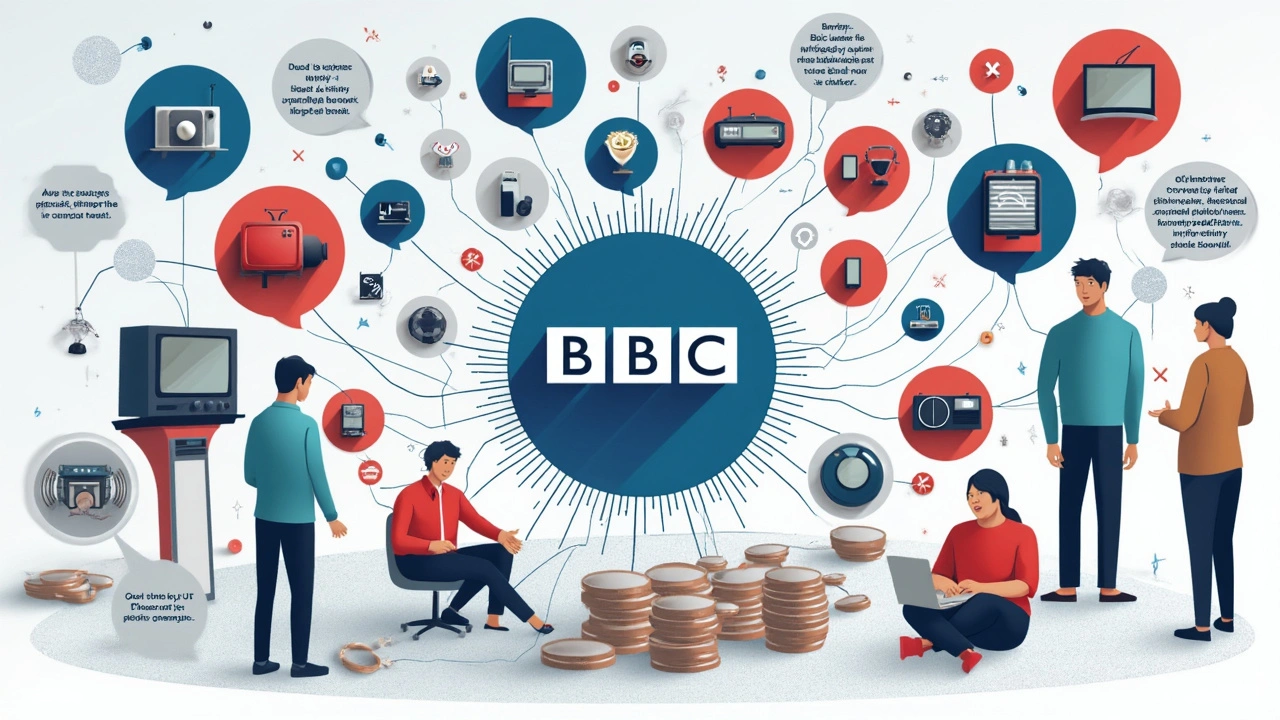
Ask anyone in Britain about the BBC, and you’ll get an opinion. But few people know who actually owns this media giant. The answer isn’t as simple as naming a businessman or the government.
The truth? The public owns the BBC. Yep, if you live in the UK and pay the TV licence fee, you’re part of it—at least in a way. The BBC doesn’t have shareholders, and nobody can buy it or sell it. It was set up in 1922 to serve the British public, not to make rich people richer.
This setup makes the BBC different from Sky, ITV, or Netflix. Those companies have direct owners or big investors. The BBC owes everything to the licence fee and its Royal Charter, a special document agreed with the government that acts like its rulebook. Wondering how that actually works day to day, and who calls the shots? Those are the million-pound questions shaping your radio shows, dramas, and even breaking news.
- BBC: Not Your Average Media Company
- Who Actually Owns the BBC?
- How Is the BBC Funded?
- Who Decides What the BBC Does?
- Everyday Tips: Navigating BBC Rules
BBC: Not Your Average Media Company
When you think of big media, you expect ads, paid subscriptions, or some billionaire calling the shots. The BBC flips that on its head. It’s been around for just over 100 years, making it one of the oldest and most-watched broadcasters in the world.
The BBC, or British Broadcasting Corporation, isn’t owned by a business mogul or the government. Instead, it’s written into law as a public service broadcaster and operates under a Royal Charter. This means it exists to serve the public and not chase profits. It answers to viewers and listeners, not shareholders or advertisers.
Unlike Netflix or ITV, the BBC doesn’t show ads on its UK channels. This sets it apart right away. It also runs everything from TV and radio to news websites, educational content, and local reporting—most of it funded by the TV licence. If you own a TV or stream live British television, you’ve probably paid it yourself.
Here’s another key point: the BBC is strictly regulated to stay neutral. Its news coverage, for example, is constantly under the microscope for balance and accuracy. That’s not just a claim; Ofcom, an independent watchdog, checks that the BBC sticks to its mission as part of its legal agreement.
So when people ask, “Who owns the BBC in Britain?” the real answer is: it’s built to serve ordinary people, powered by their licence fees, and held to account by strict rules—totally different from the typical media company.
Who Actually Owns the BBC?
So, who owns the BBC? The short answer is: nobody in the usual sense. You can’t buy shares in the BBC, and it’s not up for sale like a private company. The BBC is set up as a public corporation under a Royal Charter. That means it exists because of an official agreement with the government, and it’s meant to work for everyone in the UK.
Here’s the bottom line: the BBC ownership is public. Every household that watches or records live TV in the UK has to pay a TV licence fee. That money keeps the BBC going. You’re not exactly a part-owner like when you have shares in a company, but your licence helps fund everything you see and hear on BBC platforms.
No government department or politician owns the BBC, either. The government can’t just walk in and take over. Instead, the BBC is managed by a Board, which acts a bit like a referee. They make sure the BBC follows its rules and sticks to its mission of serving the public—staying independent from party politics and private business interests.
One quirky fact: because of this setup, the BBC can’t run ads in the UK like ITV or Channel 4. It can’t chase cash from advertisers, and it doesn’t rely on selling stuff or boosting profits for investors. That’s why you get things like planet documentaries and news shows without commercial breaks every five minutes.
To sum up, nobody “owns” the BBC in a way that means profit, control, or selling rights. The public, through the licence fee, funds the BBC, and a Board steers it according to rules set in the Royal Charter. It’s a model you don’t see much anywhere else in the world.

How Is the BBC Funded?
Most folks in the UK hear about the TV licence fee, but what does that actually pay for? The BBC gets most of its money from this fee—basically, anyone watching or recording live TV, or watching BBC iPlayer, needs to pay it. Right now, the standard TV licence costs £169.50 per year for a colour TV, which covers one household. Some groups get a discount, like people over 75 who receive Pension Credit, or those who are blind.
Here’s what’s interesting: around 93% of the BBC’s total cash comes straight from that licence fee. The rest comes from extra things the BBC does, like selling shows to other countries (think Doctor Who in America), running channels like BBC Studios, or selling BBC-branded products and services.
| Funding Source | % of Total Income (2023) |
|---|---|
| TV Licence Fee | Approx. 93% |
| Commercial Activities | Approx. 7% |
The licence fee isn’t optional if you watch live TV or use iPlayer—it’s the law. But if you only watch things on Netflix, YouTube, or any streaming that isn’t live UK TV or BBC iPlayer, you don’t have to pay it. That’s why more people ask: do I still need a TV licence? Always double-check before cancelling, though, because fines can be big—up to £1,000.
When it comes to spending, the BBC has to report where the money goes every year. The biggest slices usually go to TV content, radio, and online services. And if you care about value for money, you can check the BBC Annual Report—it’s not what most people read for fun, but it’s all there in black and white.
- Pay the licence if you use BBC iPlayer or watch live TV in the UK.
- If you qualify for certain benefits or are visually impaired, check for discounts.
- You can see where every pound goes by reading the BBC’s yearly financial statements.
So, if you ever wondered whether your licence fee actually runs the BBC, the answer is a big yes. This money keeps BBC programmes, news, and radio ticking over—without ads or direct government control.
Who Decides What the BBC Does?
This is where it gets interesting. You might assume the government pulls all the BBC’s strings, but it’s not quite like that. The BBC operates under a Royal Charter—the latest one started in 2017 and runs until 2027. This Charter sets the main rules, but it deliberately keeps the government at arm’s length to protect the BBC’s independence.
The BBC Board sits at the top. This group has a mix of people: some picked by the government, others chosen by the board itself. Their job is to set strategy, make sure the BBC sticks to its public service duties, and hold top bosses to account. The actual day-to-day boss is the Director-General. In 2023, Tim Davie held this job. He’s like the BBC’s chief exec, but the Board keeps him in check.
Here’s a quick breakdown of who calls the shots at the BBC:
- BBC Board: Sets long-term direction, checks on standards, and approves big decisions.
- Director-General: Runs the show every day, oversees news, entertainment, sport, and everything in between.
- Ofcom: The UK’s media regulator. Keeps a close eye on the BBC, making sure it’s fair, accurate, and doesn’t go wild with taxpayer money.
The government doesn’t get a say in what stories the BBC runs or how it reports the news. The idea is that the BBC stays neutral, even when both politicians and people on the street like to complain about bias. In fact, the BBC is required to be impartial as part of its Charter and Ofcom rules. If they mess up, Ofcom can slap them with fines or demand changes.
"The BBC’s editorial independence is central to its trust and credibility with audiences... The Charter ensures this independence is protected." – Ofcom Report, 2023
Check out this snapshot of who does what:
| Role | Who Picks Them? | Main Job |
|---|---|---|
| BBC Board Chair | UK Government | Leads Board, ensures BBC serves the public |
| Non-Exec Board Members | Mix: Gov & Board | Scrutinise, advise, approve big calls |
| Director-General | BBC Board | Oversees all operations |
| Ofcom | Parliament | Regulate, monitor, investigate, fine |
You don’t get to vote for these folks, but if you’ve got a beef with BBC content, you can complain. Anyone upset by what’s on air can go straight to the BBC—and if that fails, they can take it to Ofcom. They actually get thousands of complaints every year, proving people watch closely.

Everyday Tips: Navigating BBC Rules
If you’re in the UK, dealing with the BBC isn’t just about tuning into EastEnders. There’s a web of rules behind what you can do and what you need to pay, all tied to the BBC ownership setup.
The main rule? If you watch or record live TV on any channel, or use BBC iPlayer, you legally need a TV licence. That covers laptops, tablets, phones—doesn’t matter. In 2025, the standard licence costs £169.50 a year. Students get a partial refund if they return home for summer, and people over 75 get it free if they get Pension Credit, but it's not universal anymore.
A lot of folks get tripped up because you don’t need a licence for streaming platforms like Netflix, or for catch-up shows on ITVX, unless it’s live TV. But as soon as you load anything live, or open BBC iPlayer, a licence kicks in. Here’s what you should remember:
- If you only watch on-demand stuff from non-BBC sources, you can tell TV Licensing and opt out.
- The BBC can send officers to your home if they suspect you’re dodging the fee, but they need a warrant to enter.
- Letters about licence checks are automated—don’t panic at the scary red ink. But dodging the fee can lead to a £1,000 fine (rare, but it happens).
Lots of people wonder where their money goes. Here’s a quick breakdown (figures from the BBC’s 2023 Annual Report):
| Area | How Licence Fee Was Spent (2023) |
|---|---|
| TV Content | £1.7 billion |
| Radio & Online | £550 million |
| BBC World Service | £215 million |
| Other Services (tech, admin, etc.) | £585 million |
Don’t forget, you can check all your payment status and rules at tvlicensing.co.uk—it’s easier than you think. And if you want BBC content without fuss, look into the TV licence’s Simple Payment Plan, which spreads costs out monthly for those who need it.